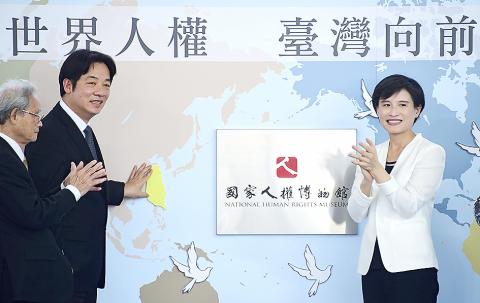A former political prisoner arrested during the Martial Law era praised the establishment of the National Human Rights Museum yesterday as an important milestone in the history of Taiwanese human rights, saying that an honest review of history is the best way to promote social reconciliation.
Chen Chung-tung (陳中統) made the comments at the opening of the museum at Jing-Mei White Terror Memorial Park in New Taipei City, the site of the detention facility where he was imprisoned from 1969 to 1978.
Although some have criticized the Democratic Progressive Party (DPP) government’s promotion of “transitional justice” — saying that it exacerbates social conflict and characterizing it as an attempt to undermine the Chinese Nationalist Party (KMT) as a political force — the 80-year-old said South Korea and Germany are examples of nations seeking reconciliation by coming to terms with history.

Photo: Pan Shao-tang, Taipei Times
“We political victims spent our youth in jail. We can now choose to forgive, but history is about facts that cannot be forgotten,” Chen said.
The Legislative Yuan, in which the DPP holds a majority of seats, passed the Act on Promoting Transitional Justice (促進轉型正義條例) in December last year, which stipulates that a committee be established to detail the history of political repression during the Martial Law era.
Martial law was imposed in 1949 by the then-KMT regime. It was lifted in 1987, but similar restrictions remained in force on Kinmen and Matsu until 1992.
The Martial Law era followed the 228 Incident in 1947, which refers to a brutal crackdown by the KMT government of Chiang Kai-shek (蔣介石) after an anti-government uprising, and was followed by arrests and executions of political dissidents.
The political suppression ended in 1987 and later became known as the White Terror era.
The proposed committee would be entrusted with several goals: making political archives more readily available, removing remnants of Taiwan’s authoritarian past, redressing judicial injustices, producing a report on the history of the period and taking steps to promote transitional justice.
The opening of the museum in New Taipei City came one day after another branch was opened on Green Island off Taitung County. The sites of the two museums were detention facilities during the White Terror era.
Premier William Lai (賴清德) presided over yesterday’s opening, which was also attended by Minister of Culture Cheng Li-chiun (鄭麗君), National Human Rights Museum Director Chen Jun-hung (陳俊宏) and nearly 100 former political prisoners and their families.
Starting next month, the government is to make public 1,038 political archives in the hope of “returning facts to history, turning the land of political trials into a land of reconciliation,” Cheng told the ceremony.

NATIONAL SECURITY THREAT: An official said that Guan Guan’s comments had gone beyond the threshold of free speech, as she advocated for the destruction of the ROC China-born media influencer Guan Guan’s (關關) residency permit has been revoked for repeatedly posting pro-China content that threatens national security, the National Immigration Agency said yesterday. Guan Guan has said many controversial things in her videos posted to Douyin (抖音), including “the red flag will soon be painted all over Taiwan” and “Taiwan is an inseparable part of China,” while expressing hope for expedited “reunification.” The agency received multiple reports alleging that Guan Guan had advocated for armed reunification last year. After investigating, the agency last month issued a notice requiring her to appear and account for her actions. Guan Guan appeared as required,

A strong cold air mass is expected to arrive tonight, bringing a change in weather and a drop in temperature, the Central Weather Administration (CWA) said. The coldest time would be early on Thursday morning, with temperatures in some areas dipping as low as 8°C, it said. Daytime highs yesterday were 22°C to 24°C in northern and eastern Taiwan, and about 25°C to 28°C in the central and southern regions, it said. However, nighttime lows would dip to about 15°C to 16°C in central and northern Taiwan as well as the northeast, and 17°C to 19°C elsewhere, it said. Tropical Storm Nokaen, currently

PAPERS, PLEASE: The gang exploited the high value of the passports, selling them at inflated prices to Chinese buyers, who would treat them as ‘invisibility cloaks’ The Yilan District Court has handed four members of a syndicate prison terms ranging from one year and two months to two years and two months for their involvement in a scheme to purchase Taiwanese passports and resell them abroad at a massive markup. A Chinese human smuggling syndicate purchased Taiwanese passports through local criminal networks, exploiting the passports’ visa-free travel privileges to turn a profit of more than 20 times the original price, the court said. Such criminal organizations enable people to impersonate Taiwanese when entering and exiting Taiwan and other countries, undermining social order and the credibility of the nation’s

‘SALAMI-SLICING’: Beijing’s ‘gray zone’ tactics around the Pratas Islands have been slowly intensifying, with the PLA testing Taiwan’s responses and limits, an expert said The Ministry of National Defense yesterday condemned an intrusion by a Chinese drone into the airspace of the Pratas Islands (Dongsha Islands, 東沙群島) as a serious disruption of regional peace. The ministry said it detected the Chinese surveillance and reconnaissance drone entering the southwestern parts of Taiwan’s air defense identification zone early yesterday, and it approached the Pratas Islands at 5:41am. The ministry said it immediately notified the garrison stationed in the area to enhance aerial surveillance and alert levels, and the drone was detected in the islands’ territorial airspace at 5:44am, maintaining an altitude outside the effective range of air-defense weaponry. Following